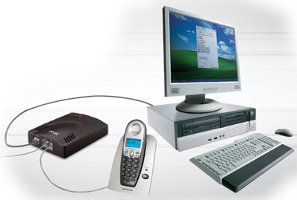VoIP Service In An Internet Café
 In a country like the Philippines where millions of its citizens are living and/or working abroad, Voice over Internet Protocol or VoIP is a mature technology which could have been a viable and lucrative addition to the services offered by Internet cafés. But for some reasons, definitely not technical, our countrymen cannot avail of this technology which could be very affordable if only the i-cafés will be allowed to offer the service to the public. I am not speaking of the Skype or YM Voice which are PC to PC VoIP services and can be used for free by an i-café customer. I am talking here about a customer using a PC or a VoIP phone in an Internet café to call a landline or a cellphone of a friend or relative living or working abroad and vice-versa. While free PC to PC voice calling (Skype, YM Voice, etc.) are practical for appointed or scheduled meetings online, such service cannot be used for emergencies or other situations when the other party is not on his PC.
In a country like the Philippines where millions of its citizens are living and/or working abroad, Voice over Internet Protocol or VoIP is a mature technology which could have been a viable and lucrative addition to the services offered by Internet cafés. But for some reasons, definitely not technical, our countrymen cannot avail of this technology which could be very affordable if only the i-cafés will be allowed to offer the service to the public. I am not speaking of the Skype or YM Voice which are PC to PC VoIP services and can be used for free by an i-café customer. I am talking here about a customer using a PC or a VoIP phone in an Internet café to call a landline or a cellphone of a friend or relative living or working abroad and vice-versa. While free PC to PC voice calling (Skype, YM Voice, etc.) are practical for appointed or scheduled meetings online, such service cannot be used for emergencies or other situations when the other party is not on his PC.
Setting up a VoIP or Internet phone is not that expensive nowadays. However, we must take note that one must have an always-on Internet connection to avail of such service and at current prices, that is a minimum of PhP900.00 per month plus the charges of the Internet Telephony Service Provider (ITSP) for the calls he will make. If only the i-cafés will be allowed to offer the VoIP service, the cost to an ordinary citizen would be much less.
So what is preventing the i-cafés to openly offer VoIP service? I should say, many and majority of the reasons have something to do with the numerous NTC regulations on the matter. One is the classification of VoIP as a Value-Added Service (VAS) requiring the provider to register with the agency as such. Another NTC regulation requires business establishments offering outgoing and incoming calls to register as Public Calling Office (PCO) before they can offer the service to the public. There is also the requirement for NTC type-approval of any Customer Premise Equipment (CPE) that will be connected to the facilities of a telco. Last but not least is the fact that the Internet Service Providers (ISPs) in the country are also the telcos who can terminate the Internet connection of i-cafés once any violation of the aforementioned NTC regulations are found. I shall deal more about these regulations in my future posts. Watch for them.




[…] VoIP Service In An Internet Café […]
[…] See the original post here: VoIP Service In An Internet Café […]
[…] more: VoIP Service In An Internet Café By admin | category: voip phone service, voip service | tags: free-live, internet, […]
[…] VoIP In a country like the Philippines where millions of its citizens are living and/or working abroad, Voice over Internet Protocol or VoIP is a mature technology which could have been a viable and lucrative addition to the services …Continued […]
I like to take breaks throughout the day and browse through some blogs to find out what other people are saying. This weblog appeared in my searches and I couldn’t help but clicking on it. I’m happy I did mainly because it had been a incredibly pleasant learn.